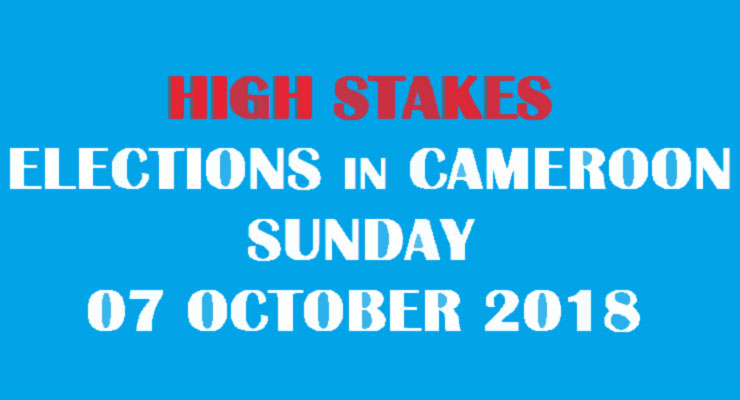
The Cameroon presidential election Sunday 07 October 2018 will pit incumbent President Paul Biya, in power since 1982, against 8 challengers. The election is set to take place as violence persists in the North West (NW) and South West (SW). A boycott is equally expected in these separatist-leaning conflict-stricken Anglophone regions.
Biya has been in power for 36 years. He is largely expected to win a sixth mandate in the election. His tight control of the government, the electoral administration, the security forces, the anaemic nature of the opposition and the conflict in the two English-speaking regions of the country are factors observers say would enable an easy win for the incumbent.

However, against all expectations, major contenders Joshua Osih of the leading opposition party, the Social Democratic Front (SDF), Maurice Kamto of the Cameroon Renaissance Movement (CRM), Akere Muna of the Popular Front for Development (PFD) and Cabral Libii of the Univers party have been able to attract large crowds during their campaigns. This must have inspired a too late initiative by Muna and Kamto to establish a coalition Friday.
The other challenges are Adamou Ndam Njoya of the Cameroon Democratic Union (CDU); Garga Haman Adji of the Alliance for Democracy and Development (ADD); Serge Espoir Matomba of the United People for Social Renovation (PURS) and; Pastor Ndifor Afanwi Franklin of the Cameroonian National Citizen Movement (CNCM).
One key issue in this election is the conflict in the English-speaking regions of the country. Biya personally went out on campaign only in the Far North Region of the country where the Boko Haram insurgency has destabilized most of the Lake Chad area. In that hotbed of conflict and insecurity, he promised hell to the “so-called Anglophone liberators” saying he will crush them after the elections.
Since the crisis started in the regions, Biya has never set foot there to address the problem. Instead, he has fielded the army to combat an entire population. Therefore, a win for Biya might see a spike in violent confrontations in the area as his “Force of Experience” slogan for the election might effectively translate into “The Experience of Using Force”. On the contrary, an opposition win, which is unlikely, would certainly ease tensions as major contenders have promised to pull out troops from the regions concerned and engage in discussions with the separatists if elected in the Sunday presidential poll.
The campaign has been going on smoothly in the francophone regions but the Anglophone regions have seen very little campaign activity. Biya’s ruling Cameroon People Democratic Movement (CPDM) has campaigned in the regional capitals of the NW and SW, that is Bamenda and Buea respectively. However, this has been amidst tight security and in the absence of the actual voters of the regions. In Bamenda, CPDM militants invited themselves into the Bamenda Congress Hall and resorted to mocking the separatists then ended their meeting with a dance to celebrate their victory. In Buea, militants of the CPDM were ferried-in from nearby francophone regions.
The atmosphere is very tense, especially in the English speaking regions where from every indication almost no one would set foot on the streets. Churches brought forward their Sunday prayer services to Saturday. Cameroon is increasingly a divided country, hate speech and government rhetoric of “the state does not negotiate with terrorists” are further driving hopes for a solution to the crisis in the Anglophone regions down the drain.
Depending on who wins this election, Cameroon’s future in terms of peace, security, social cohesion and integration, and economic development are in play. Some sources say more than 1000 people have lost their lives in the Anglophone crisis that has been raging since November 2016. Among these are some 200 government forces and scores of armed separatists, with civilians paying the highest price. 50000 refugees are in Nigeria from the Anglophone regions and 200000 persons have been internally displaced.
The principal take-home from the upcoming presidential election in Cameroon scheduled for Sunday 07 October 2018 is that elections in Africa since the (re)democratisation of the early 1990s are yet to become truly democratic.
Leave a Reply